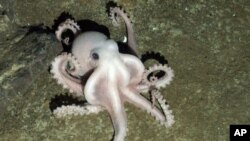Several species of previously unknown marine animals have been discovered thriving in one of the strangest habitats on Earth - next to hydrothermal vents on the ocean floor near Antarctica, in an environment that is too hot, too dark, and too toxic to support most other sea life.
The Britain-based researchers who made the discovery say the newly-found species include predator sea stars, yeti crabs, fields of stalked barnacles, sea anemones, and a very pale octopus. The scientists used a remote-controlled vehicle to explore the vents, which protrude from the ocean floor almost 2,400 meters beneath the surface of the Southern Ocean, at a site near Antarctica.
Absent from these Southern Ocean vents were communities of the many species found at hydrothermal vents in the Pacific, Atlantic and Indian Oceans. The researchers say the difference between the separate groups of animals suggests the Southern Ocean may act as a barrier to some vent species.
The first hydrothermal vents were discovered in the Pacific Ocean along the Galapagos Ridge in 1977. They provide an extremely low-oxygen habitat that is completely devoid of sunlight. The temperature of continuously billowing plumes of gases and fluid flowing out of the vents can top 400 degrees Celsius.
The animals that call these vents home are found nowhere else on Earth. Instead of depending on sun-driven energy, vent-dwelling creatures get their energy by breaking down chemicals in the nutrient-rich mixture forced up through the ocean floor from deep within the planet’s interior.
Chemical compounds, such as hydrogen sulfide, that sustain these enigmatic animals are highly toxic, or even deadly, to most other aquatic and terrestrial life, including humans.
The new Oxford University-led study is published in the journal, PLoS Biology.
The study’s lead co-author, Professor Alex Rogers of Oxford University, was part of an international panel of scientists who issued a report in June 2011 warning that marine species throughout the world’s oceans are facing an unprecedented extinction risk. Rogers says the new species he and his team discovered on the floor of the Southern Ocean provide another example of a unique aquatic ecosystem that needs to be understood and protected.
New Marine Life Species Discovered in Harsh Antarctic Waters












